- Home
- Norman Mailer
Miami and the Siege of Chicago Page 2
Miami and the Siege of Chicago Read online
Page 2
That was the first of a hundred curiosities, but there were mysteries as well. The reporter had moved through the convention quietly, as anonymously as possible, wan, depressed, troubled. Something profoundly unclassifiable was going on among the Republicans and he did not know if it was conceivably good or a concealment of something bad—which was the first time a major social phenomenon like a convention had confused him so. He had covered others. The Democratic Convention in 1960 in Los Angeles which nominated John F. Kennedy, and the Republican in San Francisco in 1964 which installed Barry Goldwater, had encouraged some of his very best writing. He had felt a gift for comprehending those conventions. But the Republican assembly in Miami Beach in 1968 was a different affair—one could not tell if nothing much was going on, or to the contrary, nothing much was going on near the surface but everything was shifting down below. So dialogue with other journalists merely depressed him—the complaints were unanimous that this was the dullest convention anyone could remember. Complaints took his mind away from the slow brooding infusion he desired in the enigmas of conservatism and/or Republicanism, and any hope of perspective on the problem beyond. The country was in a throe, a species of eschatological heave. The novelist John Updike was not necessarily one of his favorite authors, but after the assassination of Robert F. Kennedy, it was Updike who had made the remark that God might have withdrawn His blessing from America. It was a thought which could not be forgotten for it gave insight to the perspectives of the Devil and his political pincers: Left-wing demons, white and Black, working to inflame the conservative heart of America, while Right-wing devils exacerbated Blacks and drove the mind of the New Left and liberal middle class into prides of hopeless position. And the country roaring like a bull in its wounds, coughing like a sick lung in the smog, turning over in sleep at the sound of motorcycles, shivering at its need for new phalanxes of order. Where were the new phalanxes one could trust? The reporter had seen the faces of too many police to balm his dreams with the sleep they promised. Even the drinks tasted bad in Miami in the fever and the chill.
2
His first afternoon in Miami Beach was spent by the reporter in Convention Hall. He stepped up on the speaker’s podium to see how it might feel, nosed into the jerrybuilt back room back of the podium where speakers would wait, and Press be excluded, once the convention was begun. A room unmatched for dreariness. Dull green daybeds and sofas, a nondescript powder-blue rug, open studding and therefore open wall-board color, brown and tan leatherette chairs, a dreary cloth throw on a table. Every quiet color clashed with every other quiet color—it was the sort of room which could have served for the bridge players in an old folks’ summer camp in some flat and inland state. In this room, while preparing to orate, would wait some of the more ambitious men in America, and some of the more famous; looking at their manuscripts might be John Wayne, Barry Goldwater, John Lindsay, Thomas E. Dewey, Ronald Reagan, Governor Rockefeller, George Romney, Richard Nixon himself—not to mention Billy Graham—they would pass through the splendors of this profoundly American anteroom. Examination completed, the reporter abruptly decided he would actually go out to the airport to greet the arrival of a baby elephant which was arriving on a Delta cargo plane as a gift to Richard Nixon from the people of Anaheim, California. That seemed an appropriate way to open coverage of the convention.
3
Unless one knows him well, or has done a sizable work of preparation, it is next to useless to interview a politician. He has a mind which is accustomed to political questions. By the time he decides to run for President, he may have answered a million. Or at least this is true if he has been in politics for twenty years and has replied to an average of one hundred-fifty such queries a day, no uncharacteristic amount. To surprise a skillful politician with a question is then approximately equal in difficulty to hitting a professional boxer with a barroom hook. One cannot therefore tell a great deal from interviews with a candidate. His teeth are bound to be white, his manner mild and pleasant, his presence attractive, and his ability to slide off the question and return with an answer is as implicit in the work of his jaws as the ability to bite a piece of meat. Interviewing a candidate is about as intimate as catching him on television Therefore it is sometimes easier to pick up the truth of his campaign by studying the outriggers of his activity. Therefore the reporter went to cover the elephant.
It was, as expected, a modest story in a quiet corner of International Airport in Miami. Not more than ten reporters and a dozen photographers showed up. And a band, and a quorum of Nixonettes wearing blue dresses and white straw hats with a legend “Nixon’s the One.” A publicity puff was handed around which informed the Press that the beast was named Ana (for Anaheim, California) and was 52” high, 2½ years old, weighed 1,266 lbs. and had been given to Nixon by the happy citizens of the town—Ana!
Ana came in on a Lockheed 100, a hippo of a fourmotor plane with four-bladed propellers. The cargo door was in the rear, and as the musicians, Don Goldie and his Dixieland Band, white musicians from the Hilton-Miami—accordion, tuba, trombone, snares, clarinet, banjo, and trumpet—began to play, and the six Nixonettes began to strut (they looked to be high school juniors) and the plane to unload, so the black cloud on the horizon moved over, and began its drop, black tropical rain so intense even photographers had to take shelter, and a dozen, then another dozen of musicians, Nixonettes, cameramen, photographers, and animal handlers piled into a small 6 × 8 Hertz trailer later to be used for the elephant. In the steam of the interior, the day took on surreal and elegant proportions—two dozen amateurs and professionals on call for one baby elephant (said to be arriving in her tutu) were equal across the board to the logic of one political convention; by the time the rain stopped five minutes later and the elephant crate was unloaded, hoisted on a fork lift off the carrier, brought near the trailer and opened, everyone gave a cheer to Ana who came out nervously from her crate, but with a definite sense of style. She took a quick look at the still photographers surrounding her, and the larger movie cameras to which certain humans were obviously connected, stepped on the still-wet steaming runway, threw a droll red-eye at her handler, dropped a small turd to X the spot of her liberation from the crate (and as a marker in case she wanted later to retrace her steps) then did a good Republican handstand, trunk curved as graciously as a pinkie off a teacup. To which the media corps responded with approval, Nixonettes squealing, Don Goldie Band playing Dixieland, still cameras clicking, movie cameras ticking within the gears of their clockwork, Dade County police grinning as they stood to one side (four men—all armed). Then Ana from Anaheim walked on her hind legs. To much approval. She curtsied, bowed, turned in a circle, obviously pleased with herself, then stretched out her trunk in the general area of everybody’s midsection. “Hey, chum, watch your peanuts,” a man called out.
It went on for a period, the Nixonettes having their pictures taken, one girl who was not a high school junior but most likely a professional model taking care to see she was in the picture often, and all the girls kept trying to put a straw Nixon hat on Ana, but the hat kept falling off. After ten minutes, the handlers tried to coax Ana into the Hertz trailer, but she was not about to, not yet, so they walked her around a hangar, brought her back, then slipped her 1200-lb. bulk into the box with a bit of elephant handler’s legerdemain. The arrival was over.
It had been pleasant; in truth, more pleasant than the reporter had expected. It had not been tense, not even with the four armed cops. The air had been better than one might have thought. So it was a warning to one’s perspective and proportion: the Nixon forces and the Nixon people were going to be in command of small subtleties he had not anticipated. It was his first clue to the notion that there was a new Nixon. He could have read a dozen articles which said the same thing and paid no mind, for the men who wrote them were experts and so were wrong in their predictions as often as they were right. Experts he would disregard—so far as he was able—but Ana had been happy doing her handstand:
that was an unexpected fact he would have to absorb into the first freshets of his brooding. Of course the reporter had once decided (using similar methods) that Barry Goldwater could win the 1964 election. This, at least, was the method at its extreme. Still, a happy elephant spoke of luck for Nixon, or at the least, agreeable management down the line.
4
Rockefeller came in at Opa Locka Airport next day, and again it rained. The skies over Miami were at their best when rain was near, for cumulus clouds piled high on themselves, making towers, pyramids, turrets, and heavenly Miami Beach hotels two miles up in the air while dark horizontal tides of oncoming tropical storm washed through the sky, crossed the sun, gave gildings of gold and black to the towers of cumulus.
The schedule for arrival was Rockefeller on Saturday, Reagan later that evening, and Nixon on Monday. They were all of course coming in on charter flights, and the Rockefeller plane, an American Airlines 727 jet which had carried the candidate 65,000 miles into forty-five states during the campaign, was landing, for security reasons, at the Coast Guard Airport, Opa Locka, out to the west of Miami, almost in red-neck country, the town of Opa Locka still another sad sweet real estate failure of Southern Florida for it had been built to recapitulate a piece of North Africa. Residential streets with names like Ali Baba Avenue, Sesame Street, Sharazad Boulevard, Arabia Avenue, Sultan Avenue, Caliph Street, and Salim Street wound around the center of Opa Locka in complicated ovals and ellipses all planned thirty-plus or forty years ago by a real estate genius, now a town all but deserted in the afternoon sun with the storm coming on, just occasional palmettoes and the crumbling white stucco center where a small old hotel and bar stood like the molderings of a Foreign Legion fort, holding the crossroads before the Coast Guard pushed onto the airport.
Perhaps a hundred or a hundred-fifty newsmen, TV cameras, and still photographers were out at the main hangar with the Press bus, way out in the quiet empty reaches of the all but deserted airdrome, and overhead, light planes and helicopters patrolled the near sky, and four or five police cars were parked in uneasy relation to the crowd. The reporter had to show no identification to enter the gate, and needed none now; a potential assassin, tipped to Rockefeller’s entrance at Opa Locka, could have packed a piece to within a yard of him—of course, afterward, he could never have escaped. If he managed to shoot past the twenty-odd cops in the direct vicinity, the helicopters would have followed his car all the way to Miami, maybe nailed him on Arthur Godfrey Causeway from the sky. Like pieces of flesh fragmented from the explosion of a grenade, echoes of the horror of Kennedy’s assassination were thus everywhere: helicopters riding overhead like roller coasters, state troopers with magnums on their hip and crash helmets, squad cars, motorcycles, yet no real security, just powers of retaliation. It forced one to cherish major politicians—no matter how colorless, they all had hints of charisma now that they were obviously more vulnerable to sudden death than bullfighters, and so they were surrounded with a suggestion of the awe peasants reserve for the visit of the bishop—some rushed to touch them, others looked ready to drop to their knees. Thus, at least, for Rockefeller and the Press. He was surrounded almost immediately after he came down the landing ramp, and never left alone, surrounded by Press and cameramen five deep, the photographers by long practice holding their cameras and even their movie cameras up over their heads, aiming down by skillful guess, so that from a distance one could always tell exactly where the candidate was situated, for a semicircle of cameras crooned in from above like bulbs of seaweed breaking surface at high tide, or were they more like praying mantises on the heads of tall grass?—a bazaar of metaphor was obviously offered.
Rocky had come off the plane with his entourage and his wife. She was surprisingly attractive, with a marvelous high color which made her vastly better-looking than her photographs, and Rocky looked like much less than his photographs, gray beyond gray in the flesh, gray as New York City pavements, gray as an old con—the sun could not have touched him in a month or else all the fighting blood of the heart was somewhere deep inside the brain, working through the anxiety-ridden calculations with which he must have come to Miami, for Nixon with his six-hundred-plus votes now almost secure was a handful or a score or at best not fifty votes from the first ballot nomination. Anxiety had to be stirred by every omen: the weather, the first unfamiliar face to greet you off the plane, the sudden flight of a bird, the warmth of the policeman’s salutation, or the enthusiasm of the Press corps.
But if it were for that, he was elected already. Rockefeller was obviously the near-unanimous choice of the Press, and above all, the television—a mating of high chemical potentials existed between the media and the man as if they had been each conceived for the other. Except for his complexion, Rocky had an all but perfect face for President, virile, friendly, rough-hewn, of the common man, yet uncommon—Spencer Tracy’s younger brother gone into politics. He had only one flaw—an odd and unpleasant mouth, a catfish mouth, wide, unnaturally wide with very thin lips. In the center of the mouth there seemed almost another mouth which did the speaking, somewhat thicker lips which pursed, opened, deliberated—all the while the slit-thin corners of the mouth seemed off on their own, not really moving with the center. So he gave the impression of a man to whom expert instruction had disclosed what he might be expected to say—therefore only the middle of the mouth would be on call.
The rain which had begun to come down and then providentially stopped, was coming on again. So he was able to slip out of the tight ring of interviewers locked about him after answering fifty more of the million political questions he would reply to in his life, and now the press bus and the private cars were off in a race across Miami to the 72nd Street public beach in Miami Beach maybe ten miles away where a big rally was scheduled. The helicopters rode lead and flank cowhand overhead, the cavalcade sped from Opa Locka; not thirty minutes later, band playing, cymbals smashing, Rocky walked a half-block through a crowd on 72nd Street and Collins Avenue, accepting the mob, walking through them to partial deliriums of excitement, a crazy mob for politicking, dressed in bathing suits, bikinis, bathrobes, surfers’ trunks, paper dresses, terry cloth shirts, they jammed the pavement in bare feet, sandals, clod-hoppers, bathers screaming, calling out, falling in line around the free Pepsi-Cola wagon, good-natured but never super-excited—the rally was on the edge of the beach after all, and a leaden milky-green sea was pounding an erratic, nervous foam of surf onto the water’s-edge of the beach not fifty yards away.
As Rocky moved forward in his brown-gray business suit, murmurs went up everywhere—“There goes the next President of the United States.” But the crowd was somehow not huge enough to amplify this sentiment—they looked more like tourists than Republicans—all those votes he would get some day if ever he would capture the nomination. And as he moved forward through the crowd, shaking hands, saying “Hiya, hiya,” big grin on his face at the shouts of, “We want Rocky,” so also at that instant a tall skinny Negro maybe thirty years old leaped in front to shake hands and with the other hand looking for a souvenir, he flipped Rocky’s purple handkerchief out of his breast pocket. But Rockefeller showed true Republican blood. A look of consternation for one stricken gap of an instant—was this an attempt?—until seeing the handkerchief in the man’s hand, the situation was recovered: Rocky strode forward, pulled the handkerchief back, gave an admonishing look, as if to say, “Come on, fellow!” and immediately had some cardboard sunglasses pilfered from the same breast pocket by a heated happy hysterical lady tourist with whom he could not wrestle. Kerchief recovered, sunglasses offered up in tribute, he made the speaker’s stand—the flat bed of a truck—and the meeting began. The New York Times was to report 3,000 people there, perhaps it was half; they cheered everything he said, those who could hear him. The acoustics varied from punko to atrocious, and the reporter circling the crowd heard one plain buxom girl with long brown hair—hippie hints of trinket and dungarees, girl formed out of the very mold of Rockefeller sup
porters— turn nonetheless sadly to her friend and say, “I can’t hear a thing—bye bye.” Next step, a sixty-year-old blonde in a bikini with half of a good figure left (breast and buttocks) the flesh around her navel unhappily equal to the flesh around her neck, wearing orange plastic bracelets, gold charm necklace, rings, rhinestone sunglasses, wedgies, painted toes, red hot momma kisser lips, a transistor radio giving rock, and she—whatever she was hearing—out to yell, “Rocky, we want Rocky,” beating out the rhythm on one of her two consorts, the one younger than herself; the older, a husband? had a cigar, a paunch, and that benign cool which speaks of holding property in Flatbush in Brooklyn, and putting up with a live-wire wife.
But indeed it must have been reminiscent to Rocky of campaigning on beaches in Brooklyn and Queens, not Coney Island so much as Brighton or Manhattan Beach or Jacob Riis Park: the crowd had the same propinquity, same raucous cheery wise hard middle-class New York smarts— take the measure of everything and still give your cheer because you are there, Murray. Even the smells were the same—orgiastic onions in red hot dog and knish grease, dirty yellow sand—Rocky had to recognize it all, for when he introduced Claude Kirk, “the young alive Governor of Florida” (sole vote for him in the Florida delegation) a smattering of applause came up, a spattering of comment, and one or two spit-spraying lip blats—it was obvious the crowd didn’t know Kirk from a Mafia dance-contest winner. So Rocky shifted gears. “It’s a thrill for us from New York to be here, in Florida,” he said, “and half of you must be here from New York.” The laugh told him he was right. A delicate gloom began to come in equal to the first tendrils of mist over a full moon; God would know what his advisers had been telling him about the possible power of this open street rally on the 72nd Street beach—with luck and a mass turnout massive enough to break all records in category, he could be on his way—a people’s candidate must ride a tidal wave. This was not even a bona fide breaker. Half of his audience was from New York. Well, he was no weak campaigner. He kept it going, hitting the hard spots, “The Republican Party must become again a national party, the voice of the poor and the oppressed.” Great cheers for the size of the crowd. “The Republican Party cannot afford parochialism any longer.” Smaller cheer, slight confusion in his audience. “Parochialism” had vague connotations of Roman Catholic schools. Rocky had a good voice, man-to-man voice, Tracy, Bogart, hints of Gable. When the very rich desert their patrician holdings on the larynx (invariably because they have gone into politics) and would come over as regular grips, mill-hands and populists, they lean dependably into the imitation of movie stars they have loved. One could psych a big bet that Spencer Tracy was Rocky’s own Number One and would be on the ticket as Vice President if the election were held in heaven. It was an honest voice, sincere, masculine, vibrant, reedy, slightly hoarse, full of honest range-rider muscle, with injections from the honest throatiness of New York. It was a near-perfect voice for a campaigner; it was just a question of whether it was entirely his own or had gravitated to its function, much as the center of his mouth had concentrated itself away from the corners of his lips.

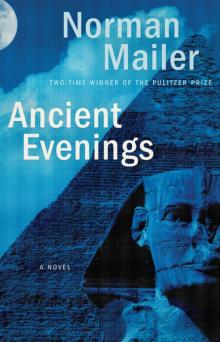 Ancient Evenings
Ancient Evenings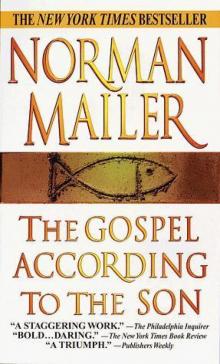 The Gospel According to the Son
The Gospel According to the Son Oswald's Tale: An American Mystery
Oswald's Tale: An American Mystery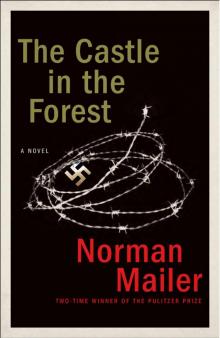 The Castle in the Forest
The Castle in the Forest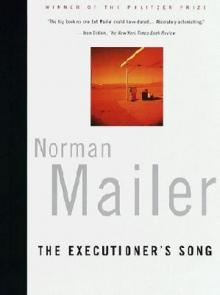 The Executioner's Song
The Executioner's Song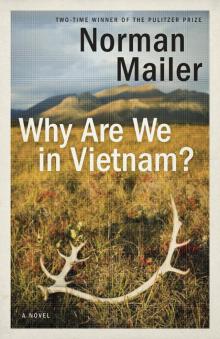 Why Are We in Vietnam?
Why Are We in Vietnam?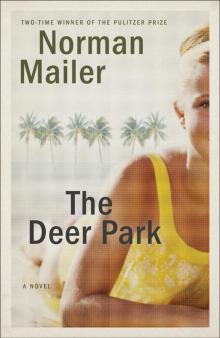 The Deer Park: A Play
The Deer Park: A Play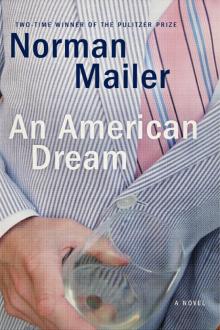 An American Dream
An American Dream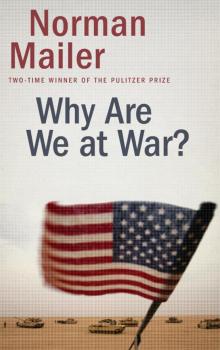 Why Are We at War?
Why Are We at War?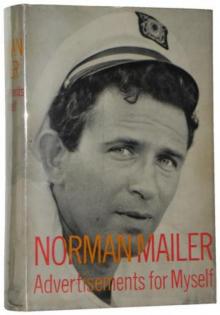 The Time of Her Time
The Time of Her Time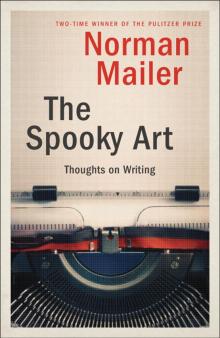 The Spooky Art: Thoughts on Writing
The Spooky Art: Thoughts on Writing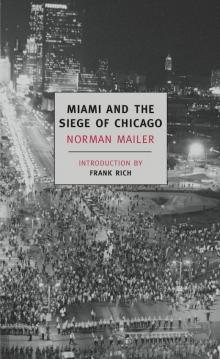 Miami and the Siege of Chicago
Miami and the Siege of Chicago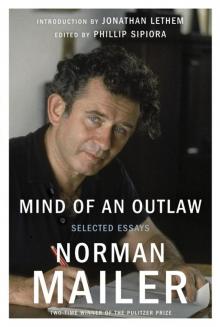 Mind of an Outlaw: Selected Essays
Mind of an Outlaw: Selected Essays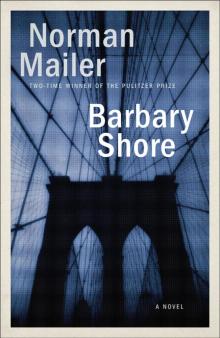 Barbary Shore
Barbary Shore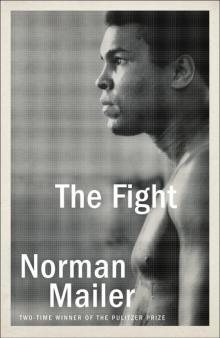 The Fight
The Fight Harlot's Ghost
Harlot's Ghost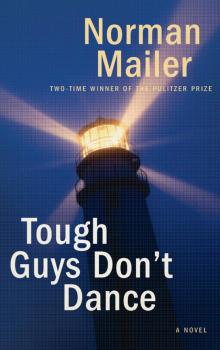 Tough Guys Don't Dance
Tough Guys Don't Dance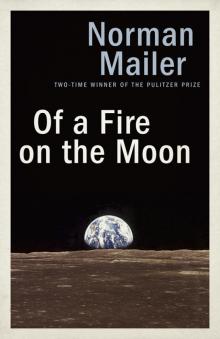 Of a Fire on the Moon
Of a Fire on the Moon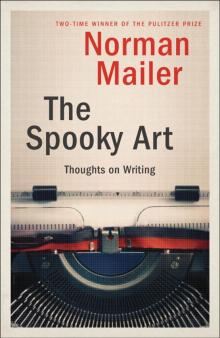 The Spooky Art
The Spooky Art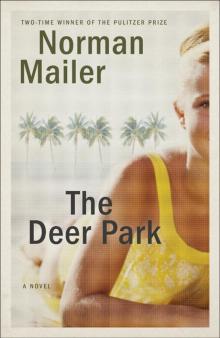 The Deer Park
The Deer Park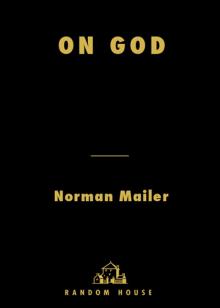 On God: An Uncommon Conversation
On God: An Uncommon Conversation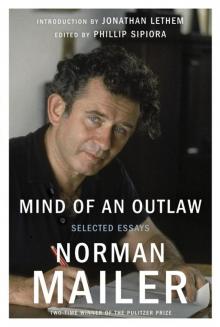 Mind of an Outlaw
Mind of an Outlaw Oswald's Tale
Oswald's Tale